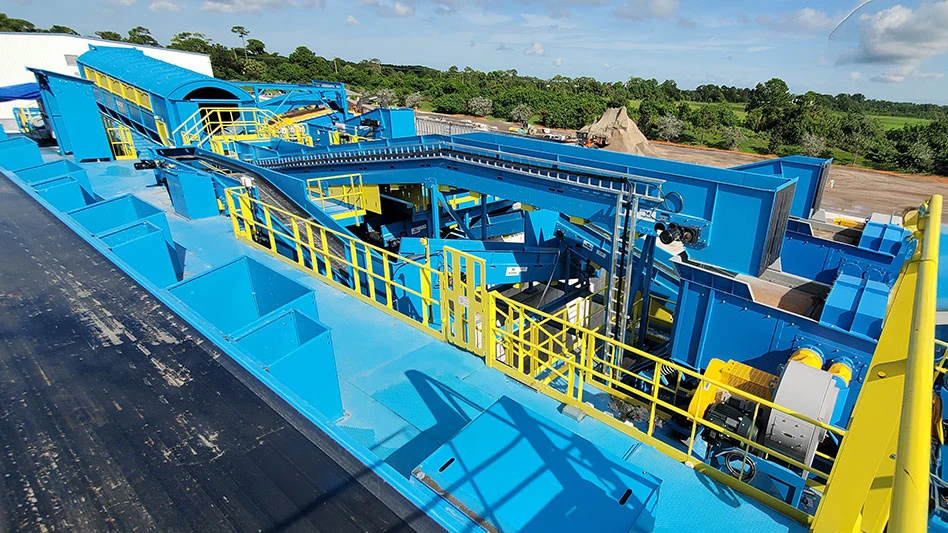Sold out attendee registration, fully booked exhibit space and lively question and answer forums at educational sessions signaled a successful Paper Recycling 2000 event, held in late June in Atlanta.
The event’s first program session, on Monday morning June 26, featured a panel with three prominent paper recycling industry executives: Georgia-Pacific director of recycling operations Victor Gaylor, Weyerhaeuser Co. vice president-recycling Michael A. Jackson, and K-C International Ltd. vice president Frank Crowley.
A standing-room-only audience of attendees listened to presentations from the three recycling executives and then offered a full slate of pointed questions.
Collecting adequate amounts of secondary fiber, keeping up with the pace of technological change, and retaining key employees were among the challenges facing the paper recycling industry as outlined by the panelists.
Jackson from Weyerhaeuser Co., Federal Way, Wash., commented that the collection rate of secondary fiber shows signs of having plateaued, possibly indicating that the industry has “picked the low-hanging fruit.”
“It’s time we challenge ourselves (before producer responsibility does) to commit to ever-steady growth in recovery,” Jackson told attendees.
Another industry-wide challenge Jackson mentioned involves the retention of employees. “Competing for talent against companies that now offer dog sitting, pets at work, HMO-type coverage for pets, free laundry, house cleaning, flex time, large signing bonuses and stock options is hard enough,” he remarked.
Jackson also noted that the paper industry overall should make advances in “presenting a good story about our industry.”
Frank Crowley of K-C International/Casella Waste, Lakewood, N.J., remarked that the industry will continue to have difficulty in securing long-term pricing contracts, due to the volatility of not only paper prices, but freight rates as well.
“[The paper recycling] market may be like a beast that you bring into your home,” said Crowley. “One day it’s content and purring, but the next day—even though it’s well fed—it just might eat you alive.”
Panelist Vic Gaylor of Georgia Pacific Co., Atlanta, also addressed the volatility issue, noting that the actions of solid waste haulers who jump in and out of the recycling market have provided one more cause for price fluctuations.
Gaylor expressed hope that comprehensive websites that offer constantly updated price indications could provide a clearer picture of the market, eliminating panic buying or selling activities that can occur when a monthly or weekly price figure is used.
Gaylor touted the ForestExpress website that Georgia-Pacific, Weyerhaeuser and International Paper are configuring as a possible contributor to the web-based change in pricing patterns. When asked by an attendee if the three companies feared any anti-trust scrutiny of the ForestExpress venture, Gaylor remarked that “the government is going to tell us that.”
Sessions that followed that day and the next offered attendees equally interesting topics and viewpoints, including looks at global markets, transportation issues, e-commerce, paper sorting technology, and supply and demand issues.
Bill Moore of Moore & Associates, Atlanta, moderated two sessions at the event, including one entitled, “The Delicate Balance Between Supply and Demand.” At the session, Moore suggested that the improved paper recycling market of late 1999 and early 2000 has been driven not only by increased demand, but also by “a slowdown in the increase of new supply collection efforts.”
Panelists at the session included Kerry Getter of Balcones Recycling, Austin, Texas, who noted that his own company reached a decision in early June to halt the solicitation of new collection efforts in response to the likelihood of a downturn in high grades markets.
Steve Ragiel of Waste Management Inc., Houston, caught the attention of attendees with a statement that the company’s leadership has made a commitment to stay involved in the recycling side of its business.
Denisse Taronji with the fiber procurement department of Kimberly-Clark de Mexico offered attendees advice on doing business in Latin America, and noted that the region should continue to present opportunities to those in the recycling industry.
David Clapp of consulting firm RISI, Bedford, Mass., predicted that Asia would have a growing impact on the paper recycling industry. He noted, though, that Asian mills are increasingly turning to Europe for supply.
Attendees with an interest in the operations side of the paper recycling business were treated to a description of optical paper sorting technology being used at a Weyerhaeuser facility in Baltimore. Garry Kenny of MSS Inc., Nashville, Tenn., gave an in-depth description of the sorting system, which has been operating since the spring of 1999.
Exhibitors included baler, conveyor and sorting equipment companies; large-scale paper recyclers and consuming mill companies; and Internet secondary fiber trading sites and custom software makers.
Crowded educational sessions, a bustling exhibit hall and an evening lobby crowd at the hosting Grand Hyatt Buckhead hotel that brought together hundreds of paper recyclers in one place helped convince a majority of attendees and exhibitors to keep their calendars clear for next year’s Paper Recycling 2001 event.
Paper Recycling 2001 has been scheduled for June 24-26 at the Fairmont Hotel in downtown Chicago, near the landmark Navy Pier. RT

Explore the August 2000 Issue
Check out more from this issue and find your next story to read.
Latest from Recycling Today
- Greenwave raises revenue but loses money in Q2 2025
- Recycled steel prices hold steady
- EY says India’s need for scrap imports will continue
- Coming full circle
- Amcor, DCM introduce fertilizer packaging with 35 percent recycled content
- Comstock Metals gets closer to commissioning commercial-scale solar panel recycling facility
- Washington selects Circular Action Alliance as PRO
- Smurfit Westrock expands in Latin America





